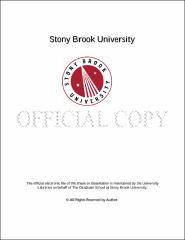| dc.identifier.uri | http://hdl.handle.net/11401/76625 | |
| dc.description.sponsorship | This work is sponsored by the Stony Brook University Graduate School in compliance with the requirements for completion of degree. | en_US |
| dc.format | Monograph | |
| dc.format.medium | Electronic Resource | en_US |
| dc.language.iso | en_US | |
| dc.publisher | The Graduate School, Stony Brook University: Stony Brook, NY. | |
| dc.type | Dissertation | |
| dcterms.abstract | This dissertation examines some of the complex questions raised by the phenomenon and experience of racism. My inquiry is twofold: First, drawing on the resources of Merleau-Ponty, I argue that the conceptual reworking of habit as bodily orientation helps us to identify the more subtle but fundamental workings of racism, to catch its insidious, gestural expressions, as well as its habitual modes of racialised perception. Racism, on this account, is equally expressed through bodily habits, and this in turn raises important ethical questions regarding the responsibility for one's racist habits; as its etymology suggests, habits are not merely passive sedimentations, but are actively held in the body. Second, I consider what the lived experience of racism and racialisation teaches us about the nature of our embodied and socially-situated being. I argue that racialised embodiment problematises and extends existing accounts of general embodied experience, calling into question dominant paradigms of the " self" in philosophy, as coherent, fluid, and synchronous. Drawing on thinkers such as Fanon, I argue that the racialised body is " in front of itself" and " uncanny" (in the Heideggerian senses of " strange" and " not-at-home" ), while exploring the phenomenological and existential implications of this disorientation and displacement. Finally, I return to the visual register to take up the question of " objectification" in racism and racialisation. While I critically examine the subject-object ontology presupposed by Sartre's account of " the gaze" (le regard), recalling that all embodied being is always already relational and co-constituting, drawing on Merleau-Ponty's concept of the intertwining I argue that racialised embodiment reveals to us the ontological violence of racism - not a merely violation of one's subjectivity as commonly claimed, but also a violation of one's intersubjectivity. | |
| dcterms.available | 2017-09-20T16:50:49Z | |
| dcterms.contributor | Mendieta, Eduardo | en_US |
| dcterms.contributor | O'Byrne, Anne E | en_US |
| dcterms.contributor | Al-Saji, Alia | en_US |
| dcterms.contributor | Casey, Edward S | en_US |
| dcterms.contributor | Yancy, George. | en_US |
| dcterms.creator | Ngo, Helen | |
| dcterms.dateAccepted | 2017-09-20T16:50:49Z | |
| dcterms.dateSubmitted | 2017-09-20T16:50:49Z | |
| dcterms.description | Department of Philosophy. | en_US |
| dcterms.extent | 220 pg. | en_US |
| dcterms.format | Application/PDF | en_US |
| dcterms.format | Monograph | |
| dcterms.identifier | http://hdl.handle.net/11401/76625 | |
| dcterms.issued | 2015-12-01 | |
| dcterms.language | en_US | |
| dcterms.provenance | Made available in DSpace on 2017-09-20T16:50:49Z (GMT). No. of bitstreams: 1
Ngo_grad.sunysb_0771E_12243.pdf: 1469989 bytes, checksum: 11427bc8dc626c26d197465a9981ce34 (MD5)
Previous issue date: 1 | en |
| dcterms.publisher | The Graduate School, Stony Brook University: Stony Brook, NY. | |
| dcterms.subject | Philosophy | |
| dcterms.subject | Critical Philosophy of Race, Phenomenology | |
| dcterms.title | The Habits of Racism: A Phenomenology of the Lived Experience of Racism and Racialised Embodiment. | |
| dcterms.type | Dissertation | |

